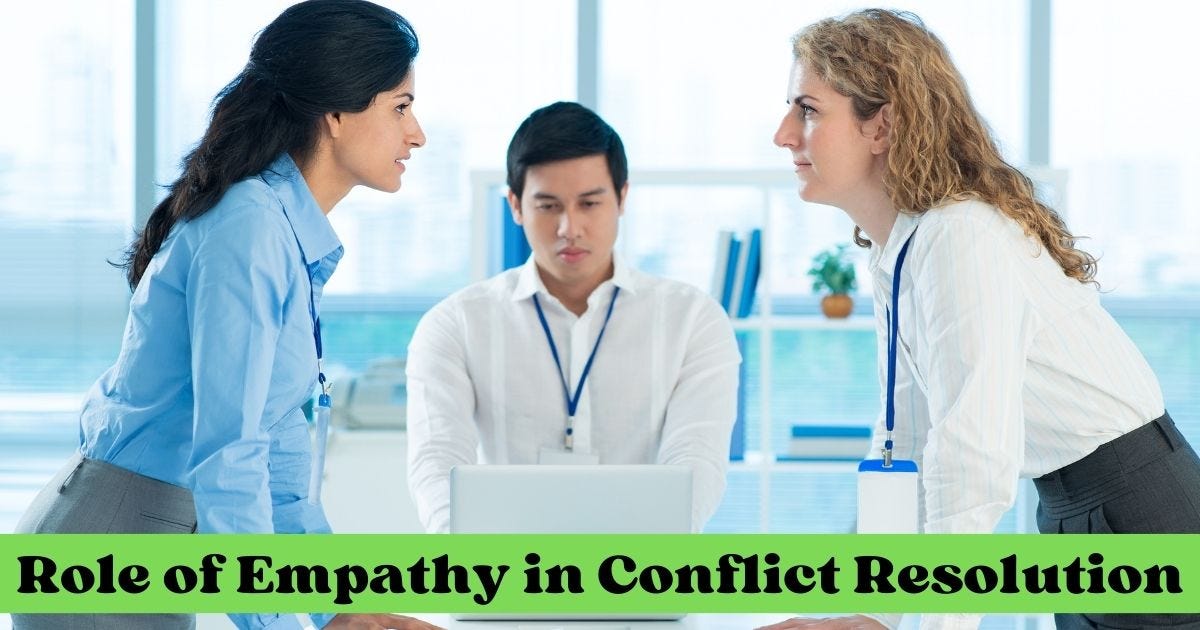Role of Empathy in Conflict Resolution
Understanding how empathy can facilitate effective conflict resolution and peaceful communication
Introduction
Conflict is an inevitable part of human interaction, and it can arise in various settings, from personal relationships to professional environments. While conflicts are often seen as negative experiences, they also present opportunities for growth and understanding. One powerful tool that can foster resolution and reconciliation in conflicts is empathy. In this article, we will explore the significance of empathy in conflict resolution and how it can transform relationships and create lasting solutions.
Understanding Empathy
What is Empathy?
Empathy is the ability to understand and share the feelings, emotions, and perspectives of others. It goes beyond sympathy, as it requires actively putting oneself in another person's shoes to grasp their experiences genuinely. By doing so, individuals can connect on a deeper level and build a bridge of understanding between conflicting parties.
The Role of Empathy in Conflict Resolution
Empathy plays a pivotal role in conflict resolution as it allows individuals to move beyond their own biases and preconceptions. When conflicting parties practice empathy, they begin to perceive the issue from multiple angles, including the other person's viewpoint. This understanding leads to more effective communication and a greater chance of finding common ground.
Benefits of Empathy in Conflict Resolution
1. Improved Communication
Empathy facilitates open and honest communication between conflicting parties. When people feel understood and validated, they are more likely to express themselves without fear of judgment. This fosters an environment of trust and mutual respect, enabling the discussion of sensitive issues and emotions.
2. De-escalation of Tension
Empathy acts as a natural de-escalator of tension. When individuals feel heard and acknowledged, their defensive barriers begin to lower. This creates an atmosphere where conflict can be approached with a calmer and more rational mindset, reducing the likelihood of hostility or aggression.
3. Strengthening Relationships
Empathy strengthens relationships by building emotional connections. When individuals experience understanding and compassion, they are more inclined to work towards a resolution collaboratively. This not only resolves the current conflict but also lays the foundation for healthier interactions in the future.
Developing Empathy in Conflict Resolution
1. Active Listening
Active listening is a crucial component of empathy. It involves giving one's full attention to the speaker, maintaining eye contact, and showing genuine interest in their words. By focusing on the other person, individuals can better understand their emotions and concerns.
2. Practicing Non-Judgment
During conflict resolution, it is essential to suspend judgment and refrain from making assumptions. Each person's experience is unique, and by avoiding preconceived notions, individuals can better appreciate the complexity of the situation.
3. Identifying Emotions
Empathy requires recognizing and acknowledging the emotions of others. This entails understanding not only what they say but also how they feel. Validating these emotions helps build rapport and paves the way for constructive dialogue.
Overcoming Challenges in Applying Empathy
1. Emotional Barriers
In some cases, individuals may have emotional barriers that prevent them from being empathetic. Past negative experiences or unresolved trauma can hinder the ability to connect with others' emotions. Addressing these barriers may require professional assistance or personal reflection.
2. Power Imbalance
Showing empathy can be challenging in conflicts involving a significant power imbalance, such as employer-employee disputes. The party in a position of authority may be less inclined to understand the other's perspective fully. Overcoming this challenge requires a conscious effort to create a level playing field for effective resolution.
Conclusion
Empathy serves as a powerful tool in conflict resolution, allowing individuals to transcend their differences and work toward understanding and reconciliation. By actively practicing empathy, we can improve communication, de-escalate tension, and strengthen relationships, leading to more effective conflict resolution outcomes. Applying empathy, however, may face obstacles such as emotional barriers and power imbalances, which need to be addressed to achieve successful conflict resolution.
Subscribe to our Weekly newsletter for such wonderful content..



